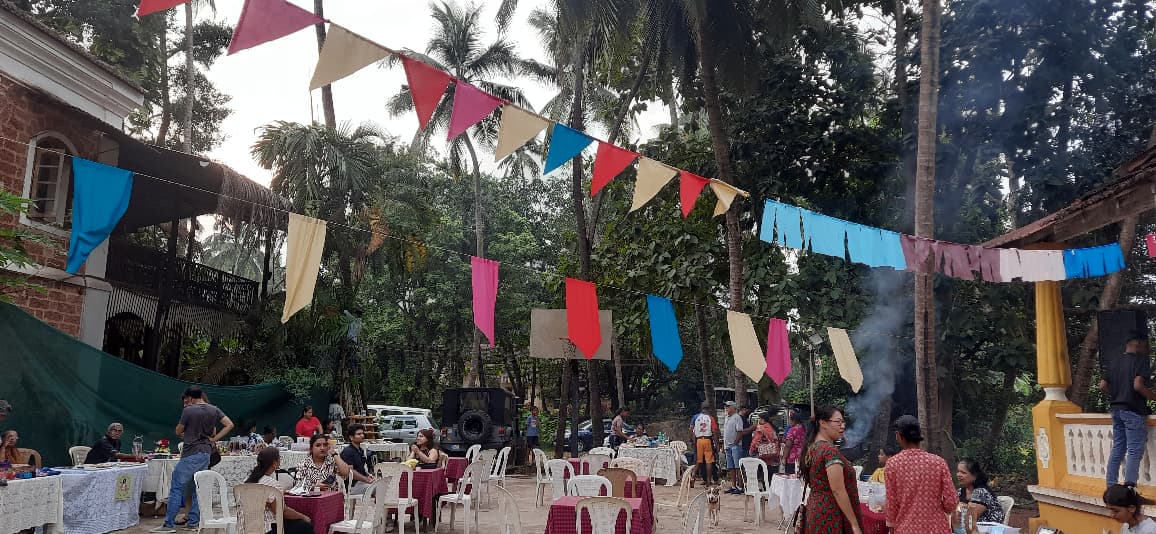
PANAJI
It offers everything – from handcrafted goods, farm-fresh produce and home-cooked Goan food to Tambola, music, games and workshops. Every item sold here is either handmade or homemade. No readymade or factory-made goods are allowed. The ‘Made in Saligao Community Market’ is special because all the vendors are Goan, most of them from Saligao itself. Every Tuesday feels like a small village festival, as the local sellers welcome visitors with traditional Goan cuisine, crafts and a cheerful community spirit. Even tourists, both Indian and foreign, travel across Goa to experience the charm of this unique market.
Each week, the market follows a different theme – it could be anything from senior citizens’ day, a Ragi festival or a palm-weaving workshop to a children’s or fruits festival. Since India celebrates Children’s Day on November 14, two Tuesdays are devoted to children’s activities this month. “This season opened with a fancy dress competition, book reading sessions by Bookworm, mask-making and ghumot workshops, live music and freshly cooked Goan dishes. We also launched our logo this year – the first time in our seventh season,” says curator Emera Remedios.
More than a place for selling goods, this is truly a community space. Villagers gather to display what they make at home – all by hand. Food is freshly cooked in small quantities to ensure nothing goes to waste. About 90 per cent of the vendors are locals, and the rest are guest vendors. The organisers ensure no two stalls sell the same products, so everyone gets a fair chance to earn.
The idea for this market began six years ago. Each season starts around the end of October and runs till April, with a break during the hot summer months. “The monsoon went on longer this year, but since our dates were fixed, we began last week and held it indoors because of the rain,” says Emera.
The market’s peak time is from November to January, when it is always buzzing with people. Emera curates the market along with co-curator Maria Fernandes, who also puts up her own stall. “For six years I’ve sold fabric items, but this time I’m offering fruit mocktails and Goan food,” says Maria, who found a steady source of income through the market. Together, the two plan themes, invite resource persons, conduct workshops, and check vendors’ menus, food quality and prices.
Over 30 regular local vendors set up their stalls every Tuesday from 4.30 to 8 pm. Visitors can find everything from fresh vegetables, home-grown plants and handmade crafts to Goan sweets, pickles, sausages, bebinca, dodol, sambarachi kodi, melgor and vonn. The market also features live barbeques, music and games, creating a lively village fair atmosphere.
Visitors include locals as well as tourists from Panaji, Dona Paula, Porvorim, Caranjalem, Vasco, Margao and Colva. The market has an old-world charm, filled with Goan flavours, songs and games like Seven Tiles, Tug of War, Dog and the Bone, Cycle Tyre Racing and Marbles.
“We recently organised Goan traditional games, and the response was overwhelming,” says Emera. “Many senior citizens came with their families and grandchildren to show them the games they played as kids. They became nostalgic — it was a priceless moment.”
Being a community market, it also welcomes guest vendors from nearby villages to fill vacant stalls. The concept has inspired other Goan villages to start their own versions, helping locals showcase their talent and earn a livelihood.
Emera herself is a creative entrepreneur who makes handmade soaps, candles, bath products and hampers. She curates the market and helps with planning, events and promotions alongside Maria. Each participant receives a token of appreciation for being part of the initiative.
“The market gave me a chance to connect with more people and serve the community. It also allows me to stay close to my children while doing something creative and meaningful,” says Emera with a smile.